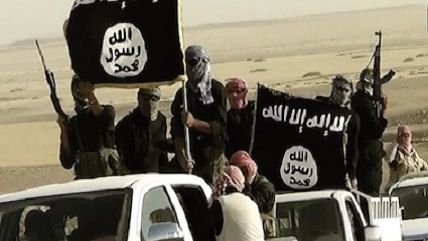The Islamic State's Tax Exiles
ISIS's adventures in state-building


It's hardly surprising that ISIS territory is a miserable place to live. It's a brutal theocracy with an especially thuggish ruling class, and on top of that it's located in a war zone. But beyond that, as The New York Times reports today, its efforts to "build statelike institutions" have encountered the same sorts of troubles that have undercut other crudely intrusive governments. There's cronyism ("Stories abound of the Islamic State putting loyal members in positions they are not qualified for"). There are dumb regulations with unintended consequences ("a ban on male doctors' treating female patients left women in one town with no doctors at all"). And an "onerous tax system" is among the forces "driving people out"—evidence that even the most fledgling states can produce tax exiles.
ISIS imposes high tariffs too, as described in another recent Times piece:
Three times a month, Mohammad al-Kirayfawai hands $300 to fighters from the Islamic State for the privilege of driving his refrigerated truck full of ice cream and other perishables from Jordan to a part of Iraq where the militants are firmly in charge.
The fighters who man the border post treat the payment as an import duty, not a bribe. They even provide a stamped receipt, with the logo and seal of the Islamic State, that Mr. Kirayfawai, 38, needs for passing through other checkpoints on his delivery route.
Refuse to pay and the facade of normality quickly falls away. "If I do not," Mr. Kirayfawai explained, "they either arrest me or burn my truck."
The latter article lists a host of other taxes, fines, and fees imposed by the Islamic State, noting that Daesh "has even fined people for driving with broken taillights, a practice that is nearly unheard-of on the unruly roads of the Middle East." Never let it be said that ISIS rejects every cultural export from the West.


Show Comments (122)